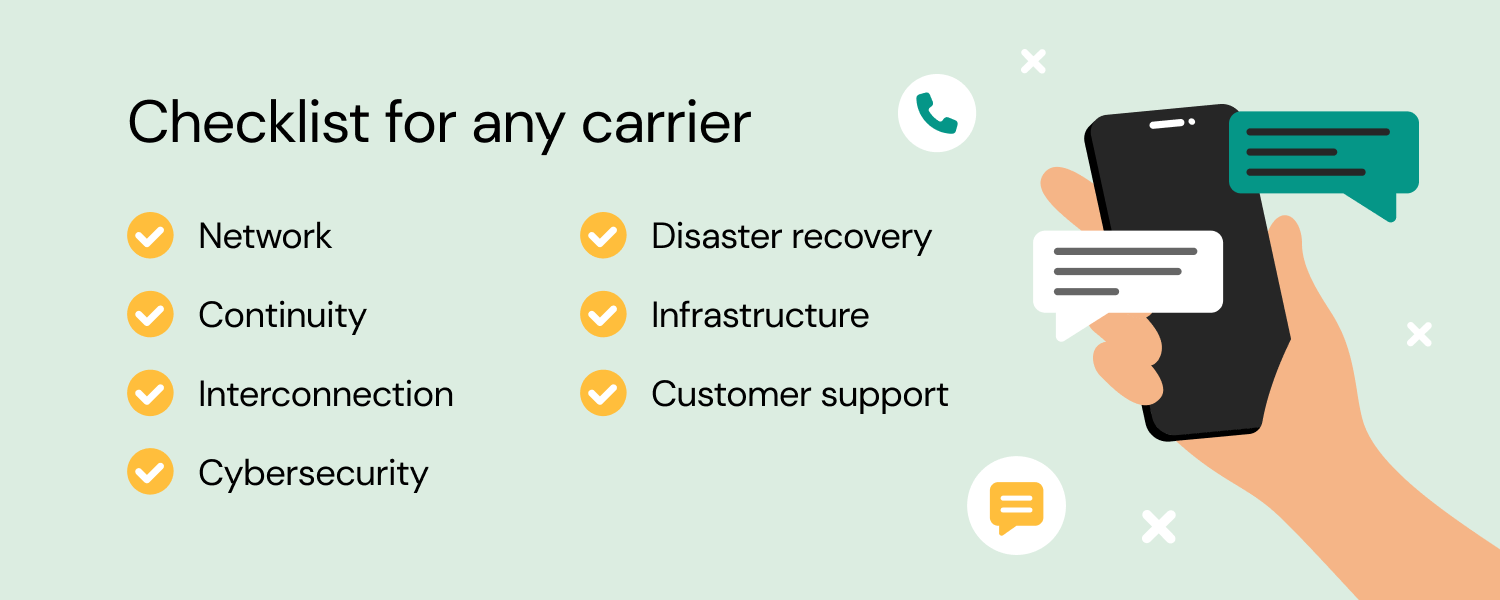It’s projected worldwide IT spending for communications services will grow by 3.8% to over US$1.5 trillion in 2024, making it a costly category in overall IT spending.
Reliable communications are at the core of any business, which is why it’s at the top of the list of IT spending.
Using unreliable services can result in more frequent and extended outages — and any downtime can bring operations to a crawl or complete standstill. This results in lost revenue as your teams, partners, and customers are unable to communicate.
Choosing your telecom carrier is a crucial decision for the overall continuity of your business. So, it’s essential to thoroughly understand any prospective carrier’s services, infrastructure, and practices to make an informed decision to minimize downtime and keep your business running.
You need a wealth of information beyond the basics to choose the right carrier for your communications services — they’re the lifeblood of your business. If your customers, teams and departments are unable to communicate, the entire organization might suffer.
We’ve created a comprehensive list of questions to help guide the process of finding your ideal carrier with a focus of ensuring uptime and network diversity.
Does your potential carrier have the right architecture and practices to keep your telecom services available? Ask them the questions on the following checklist to find out.
Checklist for any carrier
Rather than giving you a checklist of general questions, we’ve broken them into categories with brief explanations about why each group matters and helps you identify specific topics to discuss.
For example, if you already know the answers to the network questions based on the carrier’s website, you can skip to continuity.
So, let's dive into the question checklist to give you confidence in your decision before signing an agreement with your new carrier.
Network
Any potential carrier must have a robust network and monitoring capabilities to identify any potential issues before they affect customers. Ask carriers the following questions early into the conversation:
- What are your overall network monitoring capabilities?
- How hot are you running your network? Are you running it at 50%, 85%, or 115% capacity before you start augmenting?
- How does congestion affect your network? At what percent do you add capacity?
- How many minutes of traffic does your network carry each month?
- What percent of your inbound traffic routes directly? And what does this connectivity look like regarding dedicated trunking and redundancy?
Continuity
Ensuring services remain online and available is crucial for any potential carrier. The following questions directly address the possibility of outages and how they are handled:
- Do multiple phone numbers and toll-free providers provide you with the network uptime you desire?
- If there’s an outage, can you quickly move services between carriers? Are there any carrier or industry barriers?
- How does congestion affect a network? At what percent do you add capacity?
- What steps have been taken to diversify last-mile delivery?
Interconnection
Carriers don’t usually exist in a bubble but interconnect with each other. Additionally, your connection to the carrier is also an interconnection. Ask the following questions to learn more about how they handle these types of interactions:
- How does the interconnection between you and your carrier impact uptime?
- How does a network provider’s interconnection to other carriers relate to uptime?

Cybersecurity
Distributed Denial of Service (DDoS) is a common cyber-attack used against telecoms. Flooding open connections with requests and other advanced tactics can render a network unusable for authorized users.
For example, a high-profile DDoS occurred in 2021, causing significant disruptions across all industries using the carrier’s services, highlighting the importance of solid security for telecoms.
The problem isn’t going away. The estimated cost of cybercrime worldwide rose to US$8.44 trillion in 2022 from $5.99 trillion in 2021. This cost is projected to skyrocket to $23.84 trillion by 2027.
Evaluating a potential carrier's security posture is essential to minimizing downtime and ensuring the security of your data. Questions to ask include:
- Can you prevent DDoS attacks?
- Where is your network's most significant risk, and what have you done to mitigate this risk?
- A large network provider had an outage a few years ago, taking down one of their three regions. How do you ensure this won’t happen?
Disaster recovery
No one can predict the next major outage. Whether it’s a natural disaster impacting service in an area, a regional DDoS attack, or something else — all companies must have a disaster recovery plan in place. As such, providers need to be able to answer the following:
- Do you have a detailed disaster recovery plan in place?
- What processes do you have mapped out?
- Have you defined the roles and processes required to mitigate a disaster scenario? Who is responsible for what?
- How would you work to restore service in a timely manner?
Infrastructure
Infrastructure is everything in the world of telecom. Evaluate any potential carrier’s physical network before signing up:
- What kind of physical diversity does your underlying fiber network have? How do you confirm this?
- How many POPs (points of presence) do you have, and why does it matter?
- What is your equipment diversity in each POP (N+1, 2N, or 2N+1), and how long is the battery backup and generator backup? What’s the refueling plan?
- What’s your SS7 configuration and redundancy?
Customer support
Customer support and service areas are frequently overlooked elements to evaluate. You need to have a strong understanding of how they support their clients and resolve customer-impacting outages. The following questions will help you learn about these practices:
- Can you navigate a complex outage without access to the right subject matter expert?
- Do you have the resources and trained staff necessary to work through an outage?
- How many dedicated people do you have available to diagnose and resolve network issues?
- Who would handle transporting, porting, and IP issues?
- How many trouble tickets are there per billion minutes of usage?
- What is your service level agreement (SLA)?
- What is your mean time to resolve (MTTR) when outages occur?
Internal questions
All of the above questions focus on a prospective carrier so you can better understand their services before signing an agreement. However, it’s also essential to understand your own teams and capabilities as you make this decision, such as:
- Could you navigate a complex outage without access to the right subject matter expert?
- Do you have the resources and trained staff necessary to work through an outage?
- How many dedicated people are available to diagnose and resolve network issues?
- Who would handle transport, porting, and IP issues?
Now, you can evaluate any prospective telecom carrier using these questions to gain a comprehensive understanding of how they’re going to keep your services operational. As a result, you’ll have confidence in your new carrier and its network diversity.
Team up with Sinch for reliable communication services
You can see how selecting a carrier isn’t as straightforward as it might seem initially. Choosing the right carrier is the best strategy for achieving network diversity. It’s vital to have confidence in your final decision. The above checklist can help you fully understand your new carrier's support, service, and expectations.
Sinch is an industry leader providing high-quality communication services with a 99.999% uptime rating. Our leading-edge technologies and meticulously managed and monitored network give our customers peace of mind about how our services will keep your business communications operational.
Have questions about Sinch’s network? Contact us today, and we’ll show you how easy working with the right partner can be.
